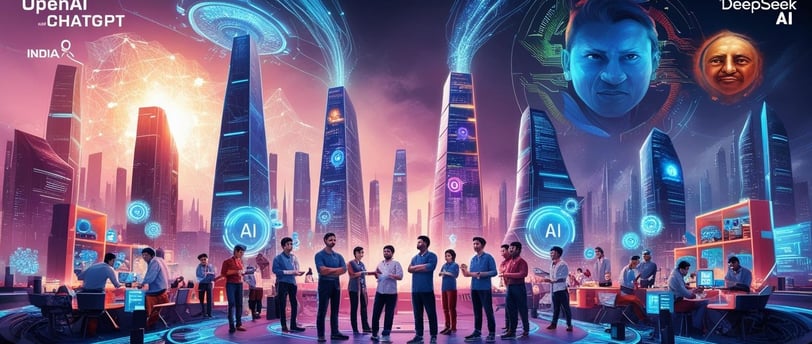Navigating the AI Frontier: India’s Journey in the Shadow of China's DeepSeek challenging OpenAI and Google's Gemini
India is on the brink of becoming a global leader in AI, fueled by its vast talent pool, growing tech industry, and government support. The country is making significant strides with initiatives like the National AI Strategy, which aims to position India as a key player in AI research, development, and deployment, on par with leaders like OpenAI and Google Gemini. Indian tech giants like TCS, Infosys, and Wipro are already making global waves with AI-driven solutions, while a vibrant startup ecosystem is driving innovation across industries like healthcare, finance, and agriculture. However, India faces several challenges, including data scarcity, language barriers, and dependency on imported AI chips, which need to be addressed for the country to fully realize its potential. Competing with emerging players like DeepSeek from China, India must also focus on fostering AI research in regional languages, developing indigenous AI chips, and creating an ecosystem that nurtures startups and innovation. To truly capitalize on the opportunities AI presents, India must invest in infrastructure, improve accessibility to data, and streamline policies to create a comprehensive national AI roadmap. With its rapid market growth, expected to reach USD 11.58 billion by 2028, India is well on its way to becoming a major force in the global AI race, alongside industry giants like OpenAI , Gemini and DeepSeek.
CHINAARTIFICIAL INTELLIGENCEINDIASCIENCE & TECHNOLOGY


Navigating the AI Frontier: India’s Journey in the Shadow of China's DeepSeek challenging OpenAI ChatGPT and Google's Gemini
India’s got a pretty big opportunity to become a global AI powerhouse. With a huge talent pool and a booming tech industry, it’s primed for some serious AI breakthroughs. But, like with anything, there are a few bumps in the road that could make reaching that potential a bit tricky. And as the global AI race heats up, India will have to keep an eye on emerging players like DeepSeek in China, who are already pushing the envelope in AI innovation.
Government Initiatives: India’s AI Push
The Indian government has definitely caught on to the potential of AI and is stepping up to make sure the country can thrive in this space. Here’s what they’re doing:
National AI Strategy: India’s set its sights on becoming a global leader in AI research and deployment. The goal is to establish a solid framework that helps India grow as a top player in the global AI race, alongside tech giants like OpenAI and Google Gemini.
Focus on Skill Development: One big hurdle India faces is the shortage of AI talent. To tackle that, programs like the National Program on AI have been rolled out, with the aim of upskilling the workforce and filling the talent gap. As AI continues to evolve, having a well-trained workforce will be key to competing with the likes of ChatGPT and other cutting-edge models.
Promoting AI Research: With initiatives like the National Research Foundation, the government is trying to foster cutting-edge AI research both in academia and across industries. It’s all about creating that perfect mix of innovation and collaboration, similar to the rapid AI advancements we’re seeing from DeepSeek in China.
Industry Efforts: India’s AI Boom
Indian companies are seriously embracing AI, with heavy investments and forward-thinking approaches happening across various sectors. Here’s what’s going down:
IT Giants: Big names like TCS, Infosys, and Wipro are throwing big money into AI research. They’re not just investing at home—they’re offering AI-powered solutions to clients around the globe, helping to shape industries worldwide. Just like OpenAI and Google Gemini are leading the charge in the West, Indian tech giants are setting their sights on becoming global leaders in AI.
Startups on Fire: The startup scene in India is absolutely buzzing with innovative AI solutions. From healthcare to finance to agriculture, new companies are coming up with fresh ways to use AI to solve real-world problems. With the rise of companies like DeepSeek in China, Indian startups have a lot to learn but also plenty of opportunities to carve out their own niches in the AI space.
Industry Collaborations: The magic really happens when academia, industry, and research institutions come together. This kind of collaboration is helping to push India’s AI agenda forward, with teams of brilliant minds working together on groundbreaking projects. It’s clear that collaboration is the key to staying competitive in an AI race that now includes DeepSeek, OpenAI, and other international players.
Challenges: The Roadblocks India Faces
Despite all the potential, there are some major challenges India needs to overcome to really make a mark in the AI world. Here are some of the biggest hurdles:
Data Scarcity and Quality: One of the biggest roadblocks is access to good-quality data. AI models need tons of clean, reliable data to learn from, but a lot of sectors in India just don’t have the infrastructure or the standardization needed to train effective models. This is a challenge that countries like China have also faced, but they’ve made big strides in overcoming it, making it something India will need to tackle head-on.
Language Barrier: India is a country with a ton of regional languages, but most AI models are built around English. This creates a massive gap in access to AI technologies, especially for those who speak in local languages. Without AI tools that work in regional languages, it’s tough to make AI truly inclusive. If India can overcome this hurdle, it would be a game-changer, not just for the country but for global AI adoption, especially in markets where ChatGPT and Gemini still struggle with non-English languages.
AI Chip Dependency: Right now, India depends on imports for the AI chips that power a lot of its AI research. This dependence can hold back the development of AI hardware and slow down the growth of the domestic AI ecosystem. If India can develop its own chips—just like DeepSeek in China is doing—it would be a major step toward self-reliance and a stronger AI ecosystem.
Talent Drain: While India is home to tons of tech talent, many of the best and brightest AI researchers are choosing to migrate to places like the U.S. for better opportunities. Losing top talent is a real issue for India’s long-term AI ambitions. Competing with the talent attraction strategies of places like the U.S. and China, where tech giants like OpenAI are based, is one of the ongoing challenges India needs to address.
High Interest Rates: Another stumbling block? High interest rates. They can make it harder for startups, especially smaller ones, to secure funding for AI research and development. That’s a big deal when you’re trying to push the boundaries of technology, especially when China has been able to back AI startups with state support.
Lack of a Coherent Policy Framework: Even though there are lots of initiatives in place, the government still needs to bring them all together in a more organized and coordinated way. A clear policy framework would help streamline efforts and ensure that the AI ecosystem grows in the right direction. India can take notes from the U.S. and China, where AI policies are already being refined to ensure their leading positions in the AI race.
Key Players in the Indian AI Landscape
There are some big names already leading the charge in India’s AI scene. Here are a few that are making waves:
TCS: One of India’s IT giants, TCS is at the forefront of AI innovation. They offer a wide range of AI-powered solutions across industries, helping businesses rethink how they use tech.
Infosys: Infosys is using AI to boost operations, improve customer experiences, and push the envelope on innovation for its clients. Their AI-driven solutions are being adopted all around the world, competing with the likes of OpenAI’s ChatGPT in transforming customer service.
Wipro: Wipro is diving deep into AI-driven digital transformation. They’re focusing on automation, data analytics, cybersecurity, and more—helping businesses improve efficiency with AI.
Haptik: Haptik is all about conversational AI. They’re known for their chatbots and virtual assistants, helping companies enhance customer engagement and automate processes. They’re giving ChatGPT a run for its money in the customer service automation space.
Fractal Analytics: Fractal Analytics is a global leader in AI-driven analytics, offering solutions that help businesses with consumer insights, risk management, and decision-making. They’re making a major impact on industries from finance to healthcare.
The Size of the AI Business in India
The AI market in India is growing fast. A report by MarketsandMarkets estimates that India’s AI market could reach USD 11.58 billion by 2028, with a crazy growth rate of 31.18% from 2023 to 2028. Clearly, the country is heading toward a huge AI boom, and this is just the beginning. As India becomes a global AI hub, it’s on track to rival the top players, including OpenAI and DeepSeek.
Addressing the Challenges: How India Can Overcome Them
To make sure India doesn’t just talk the talk but walks the walk in AI, overcoming these challenges is crucial. Here's what needs to be done:
Investing in Data Infrastructure: One of the first things that needs attention is building up India’s data ecosystem. If the country can improve data quality, accessibility, and storage, AI models will have the foundation they need to thrive.
Promoting AI Research in Indian Languages: With so many languages spoken across India, there’s a massive opportunity to focus on natural language processing (NLP) for Indian languages. By developing AI models that understand regional languages, India can make AI much more accessible to the masses.
Developing Indigenous AI Chips: If India can develop its own AI chips, it will cut down on its dependence on imports. This could not only help local businesses but also open up new avenues for innovation in AI hardware.
Creating a Conducive Ecosystem for AI Startups: To support startups, India needs to create an environment where they have access to funding, mentorship, and growth opportunities. Encouraging innovation is key to building a thriving AI ecosystem.
Developing a Comprehensive National AI Strategy: Finally, India needs a clear and cohesive national AI strategy—one that addresses everything from ethical concerns to responsible AI deployment. Having a roadmap will ensure that efforts are aligned, making India a true leader in AI development.
The Bottom Line: India’s AI Future
With the right investments and strategies in place, India has a real shot at becoming a global AI powerhouse. The country’s strengths—its talent, tech industry, and government support—are already setting the stage. But to fully realize this potential, India needs to tackle challenges like data infrastructure, language barriers, and talent migration head-on.
If India can address these issues and keep pushing forward, the future of AI here looks incredibly bright. Whether it’s through industry giants or innovative startups, India is poised to be a major player in shaping the future of AI. The race is on, and India’s got a lot to offer, alongside OpenAI, DeepSeek, and other global leaders.
